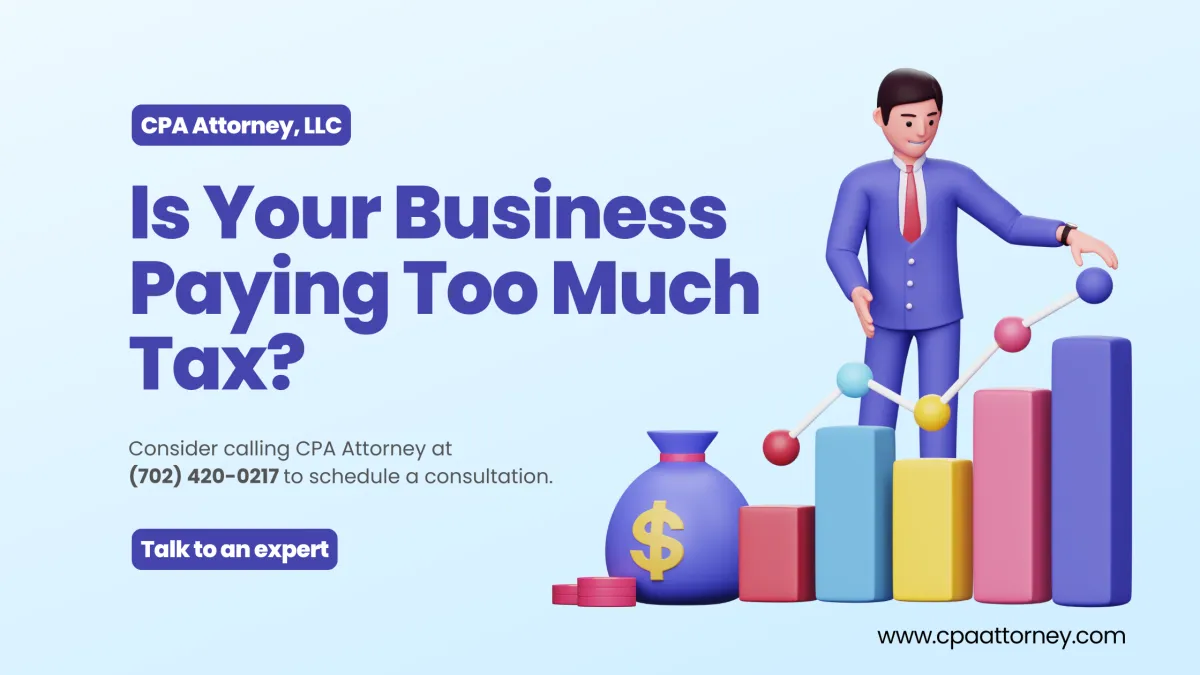Blog

Is Your Business Paying Too Much Tax?
Some businesses pay business taxes. In other cases, business owners pay taxes on the small business income by claiming it as income on his or her personal tax return. According to the United States Senate Committee on Finance, those businesses are classified as “unincorporated pass-through entities,” and the income is taxed at the owner’s personal tax rate. Because taxes for businesses are assessed based on the business structure, it may be helpful to consult with a business lawyer and an accountant to answer the question, “Is your business paying too much tax?” Some business owners may benefit from making changes to their business’s classification or might be missing deductions that would lower their tax liability. If you are looking for answers for your business tax questions, consider contacting CPA Attorney at (702) 420-0217.
Tax Rules for Each Business Structure
Small businesses generally fall into one of four categories, and each category is taxed at a different rate. The four business structures are taxed as follows:
Sole proprietorship—single owner of an unincorporated business taxed as an individual
Partnership—each partner is taxed on his or her share of the business’s income
Limited Liability Company (LLC)—taxed on shares of the business income; multi-member LLCs are taxed as partnerships
Corporation—taxed as a separate entity
A corporation is the only business structure that pays federal taxes based on the company’s net earnings. All other business structures are taxed based on the owner’s earnings. In the case of businesses with multiple owners, each owner claims a share of the business income on his or her own personal tax return.
Tax Rates for Each Business Structure
The structure of small businesses affects how the business owners pay taxes and the amount they owe. According to the United States Small Business Administration, the average tax rate for small businesses is 19.8 percent, but the classifications of each business differ. The average rates for three common business structures are:
Sole proprietorships—13.3 percent
Small partnerships—23.6 percent
Small S-corporations—26.9 percent
Tax Obligations for Small Businesses
Small business owners pay self-employment tax and income tax with payment due every quarter. Small business owners should set aside about 30 percent of their income each quarter to cover federal and state taxes. Depending on how established your business is, you may wish to have 30 percent automatically transferred into a separate account for taxes each time you are paid or every month the business turns a profit. Small businesses are assessed several kinds of taxes, including:
Payroll taxes—If the company has employees, it must pay federal income tax and Federal Insurance Contributions Act (FICA) taxes.
Income tax—Non-corporate small business owners are taxed according to their income from the business.
Self-employment tax—Small business owners pay FICA, Medicare, and Social Security taxes. Small business owners are responsible for paying the entire amount of this tax, whereas employees of a business split the amount with their employer. Since the small business owner is both “the business” and its employee, he or she must pay both portions.
Capital gains tax—If the business makes a profit on selling assets or its investments appreciate, this tax is owed on those gains.
Property tax—If a business owns land or buildings, property taxes are assessed by the local jurisdiction. The percentage varies according to the property’s location.
Dividend tax—Portions of the business’s profits that are paid to shareholders.
Sales tax—In states that have a tax on goods and services, although customers pay the tax on each transaction, the business owner is responsible for ensuring that those taxes are delivered to the state department of revenue.
Excise taxes—Some businesses may be taxed on things like highway usage or fuel.
Small business owners may wish to consult with an accountant and business attorney at CPA Attorney to ensure that they are paying the correct amount in taxes. While setting aside a third of a person’s income may seem like a lot, business owners who attempt to subvert the Internal Revenue Service (IRS) may quickly undermine their business instead. All sole proprietors and independent contractors (owner-operator small business owners) must file an annual income tax return if their net self-employment earnings were more than $400 for that year.
How Small Businesses Can Reduce Their Tax Bill
With tax liability tied to a business’s income, many small business owners understandably want to find deductions and other ways to reduce their total tax bills. A business accountant can help small business owners find deductions they are eligible for and set up a form of record-keeping to justify any exemptions to the IRS. Some deductions or exemptions can include:
The cost of buying business equipment—Small businesses may claim depreciation on business equipment for up to seven years. Some items may be eligible for a deduction of the entire cost in the first year of purchase—a significant tax benefit.
Use of personal vehicle for business activities—Business owners may opt for either the IRS’s standard mileage deduction of $0.56 or the actual costs associated with the vehicle’s use.
Contributions to retirement plans—Business owners may wish to set up independent retirement accounts for themselves and contribute a portion of the business’s income into these accounts. Contributions to retirement accounts are tax-free.
The cost of operating a small business out of your home—Deductions can include portions of the monthly utility bills, mortgage, and personal cell phone use.
Defer income—Consider sending out bills later in the month of December so that, when they are paid, the income will be credited in January of the following year.
Accelerate deductions—By paying bills due in January of the following year in December of the current year, the expenses will be deducted from the current year despite the due date on the bill.
Tax laws are constantly changing, however, and the rules for what qualifies for a deduction can change as well. Having a professional business lawyer and accountant manage a small business’s taxes, record-keeping, and deductions can help to ensure that all deductions are compliant and that the business does not miss opportunities to reduce its tax liability.
Contact a CPA Attorney
Is your business paying too much tax? Making smart decisions about your business structure and deductions can help to reduce the tax burden your small business owes and ensure that it will remain profitable enough to be a worthwhile venture. Consulting with a business lawyer can help you find ways to reduce your business’s tax obligations to the IRS or state department of revenue. Consider calling CPA Attorney at (702) 420-0217 to schedule a consultation.
Have questions? Need help? Contact us
We are available. Call us at 702-852-2577
to get connected right now, or fill out the form below and one of our representatives will contact you shortly.
Copyright 2024 – CPA Attorney


